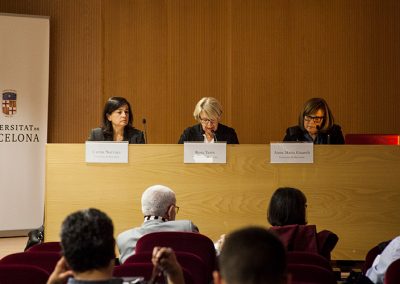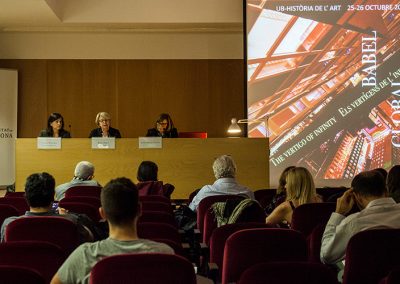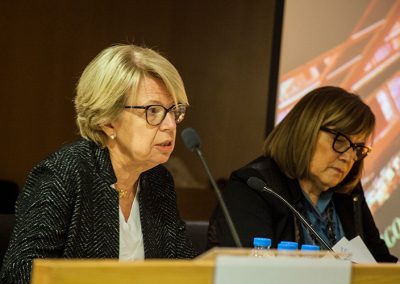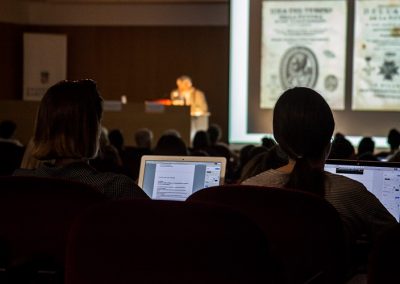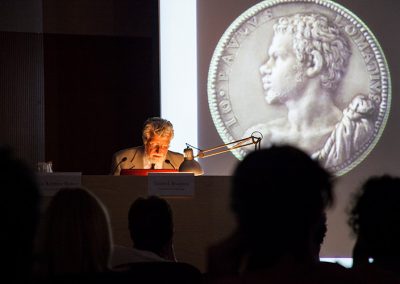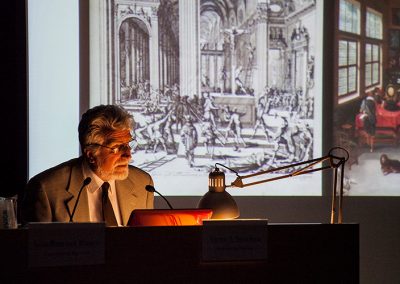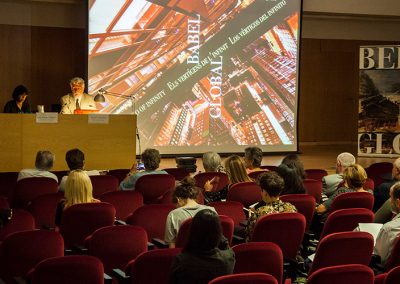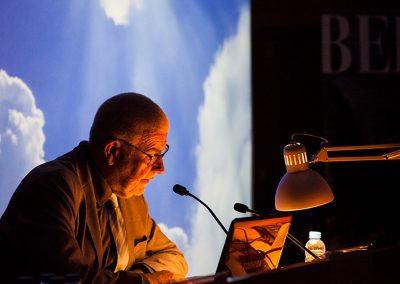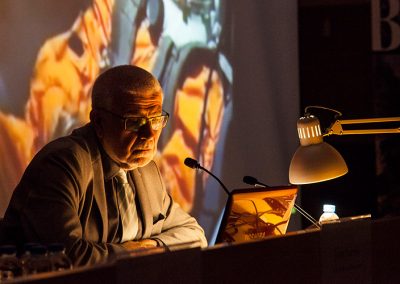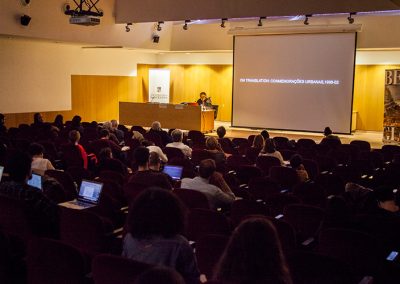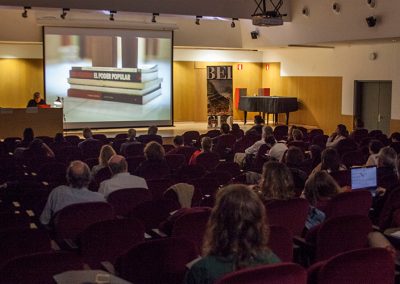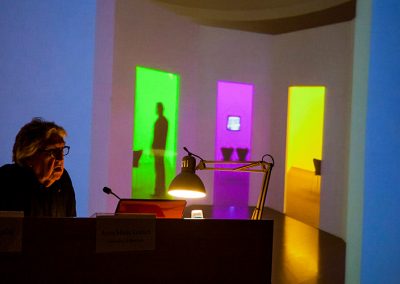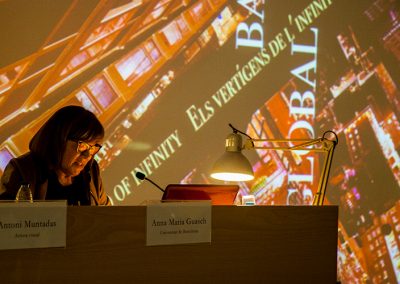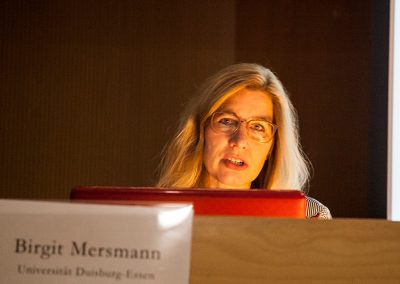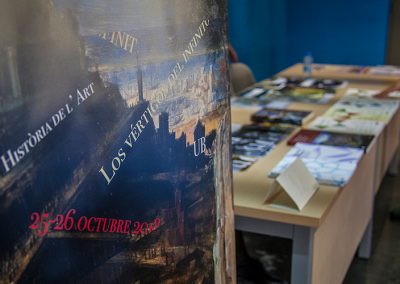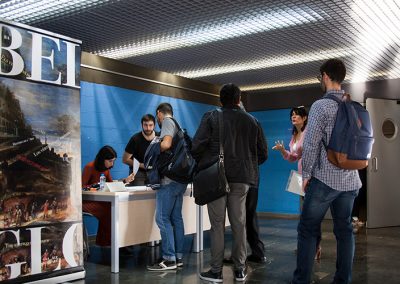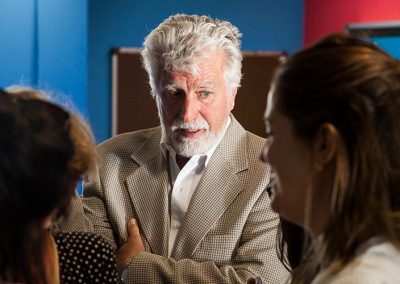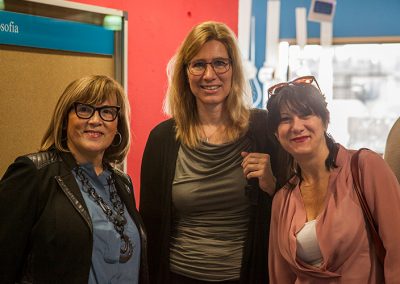Babel Global: The Vertigo of Infinity
International Conference
October 25-26, 2018, Barcelona, Catalonia
Organizing Team
Direction: Anna Maria Guasch (UB)
Co-direction: Modesta Di Paola, Julia Ramírez Blanco
Coordination: María Bendito
Organized by: R+D Excelency Project Critical Cartography of Art and Visuality in the Global Age. Third Part (I+D MICINN: HAR2013-43122P). Spanish Ministry of Economy and Productivity/ Research Group GRC: Art, Globalization, Interculturality (SGR 2017 SGR 577). Government of Catalunya. Departament d’ Empresa i Coneixement.
Collaborating Entities: Geography and History Faculty, Art History Department, University of Barcelona. Excellency R+D Project ACAF/ART IV Critical Cartographies, Analytic and Selective of the Artistic and Monumental Environment of the Mediterranean Era in the Modern Age (I+D MICINN: HAR2015-66579-P). Spanish Ministry of Economy and Productivity/ Research Group GRC: Grup d’ Estudis d’ Art Modern a l’ Àrea Mediterrània ACAF/ART GEAM (2017 SGR 462). Government of Catalunya. Departament d’ Empresa i Coneixement.
Scientific Committee
Anna Maria Guasch, Universitat de Barcelona
Modesta Di Paola, Universidad Complutense de Madrid
Francisco Jarauta, Universidad de Murcia
Birgit Mersmann, Universität Köln
Antoni Muntadas, Visual Artist
Julia Ramírez Blanco, Universitat de Barcelona
Victor Stoichita, Albert-Ludwigs-Universität Freiburg
Joan Sureda, Universitat de Barcelona
Program
OCTOBER 25
WELCOME AND INTRODUCTION
Director: Anna Maria Guasch
10:00 am
INTRODUCTION PANEL 1
“The Tower of Babel. Myth and Knowledge”
Convenor: María Bendito
10:30 am
KEYNOTE
Joan Sureda, Universitat de Barcelona
“La Conquista del Cielo”
10:45 am
BREAK
PANELIST
Ramón Faura Coll, Universitat Pompeu Fabra (Elisava)
“Laberinto Eléctrico”
12:15 pm
Paula Pérez-Rodríguez, Princeton University
“Reparto de Armas Espirituales: Alfabetización, Socialismo y Utopía Letrada en la Guerra Civil Española”
Pilar Millán, Artista Visual
“La Huella Circular”
Laia Manonelles, Universitat de Barcelona
“As a Guest of a German Family: La Construcción de la Identidad en el Marco Global”
DISCUSSION
Convenor: María Bendito
1:45 pm
INTRODUCTION PANEL 2
“Babel, Old and New. Global Art and Unfinished Projects”
Convenor: Julia Ramírez Blanco
4:00 pm
KEYNOTE
Victor Stoichita, Université de Fribourg, Switzerland
“ARS ULTIMA. The Tower and the Temple”
4:15 pm
BREAK
PANELISTS
Todd Burke Porterfield, New York University
“Against Babel”
Marta Piñol, Universitat de Barcelona
“Film as an Ideal Language and Cinema as a Visual Esperanto: Film Theories from Bela Balázs to Christian Metz”
Inés Molina, Universidad Autónoma de Madrid
“Plug-In Babel: Megaestructuras Radicales en las Ciberutopías Sesenteras”
5:45 pm
DISCUSSION
Convenor: Julia Ramírez Blanco
7:15 pm
OCTOBER 26
INTRODUCTION PANEL 3
“Visual Translation in Global Contexts”
Convenor: Modesta di Paola
10:00 am
KEYNOTE
Birgit Mersmann, University of Duisburg-Essen, Germany
«In the Open Sea Don’t Have Border.” Visual Translation of Migration in Contemporary Photodocumentaries”
10:15 am
BREAK
PANELISTS
Fabienne Brugère, Université Paris 8 Vincennes-Saint-Denis
“Visual Translation in The Era of The Global. An Ethics of the Eye”
11:45 am
Virgilio Berardocco, Università della Svizzera italiana
“On Babel’s Ruins: The Ahistorical Soundings of Harald Szeemann’s Unfinished Project”
David Aguilera, Universitat de Girona
“Les Unwanted de Europa y Walter Benjamin: Voces Sin Cuerpo, Traducciones sin Original e Imágenes sin Texto”
Vega Tescari, Università della Svizzera italiana
“Translating The Visual: Chen Chieh-Jen’s Work”
1:15 pm
DISCUSSION
Convenor: Modesta di Paola
INTRODUCTION
Anna Maria Guasch
4:00 pm
KEYNOTE
Antoni Muntadas, Multimedia Artist
“Interpretaciones y Traducciones”
4:15 pm
KEYNOTE
Francisco Jarauta, Universidad de Murcia
“Babel, Mito Moderno”
5:15 pm
BREAK
DISCUSSION
Antoni Muntadas, Francisco Jarauta, María Bendito, Julia Ramírez Blanco, Modesta di Paola
6:30 pm
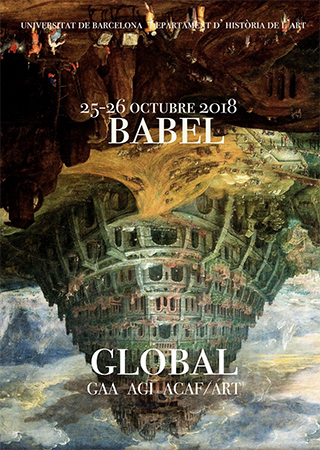 Babel with its tower, in its truncated ascension without limits, assumed the vertigo of imposed, translatable linguistic identities, the vertigo of the impossible rebellion of the inextensible against the absolute, of the finite versus the infinite. Thought and its expression got trapped in the ruins of the dense walls erected by the mediate power in its eagerness to reach the fullness of the whole, which was none other than that of the omnipotent Other. The emulation, the conquest and the overflow of power by power, the dominion of the possible or the thinkable reality by the existing reality, accompanied the slow and complex wandering, individual and collective of the human being. With their physical or symbolic verticals, Babel’s ambitions and revolutions continually and unsuccessfully challenged history. The technology of the global, the World Wide Web and hyperconnectivity have buried the last exhalations of the resounding demolition of Babel, the homologous has critically eroded the identitarian elements and flatness has done the same with the ascension. The towers of Babel now are only simulacra like the giraffe is to the spider.
Babel with its tower, in its truncated ascension without limits, assumed the vertigo of imposed, translatable linguistic identities, the vertigo of the impossible rebellion of the inextensible against the absolute, of the finite versus the infinite. Thought and its expression got trapped in the ruins of the dense walls erected by the mediate power in its eagerness to reach the fullness of the whole, which was none other than that of the omnipotent Other. The emulation, the conquest and the overflow of power by power, the dominion of the possible or the thinkable reality by the existing reality, accompanied the slow and complex wandering, individual and collective of the human being. With their physical or symbolic verticals, Babel’s ambitions and revolutions continually and unsuccessfully challenged history. The technology of the global, the World Wide Web and hyperconnectivity have buried the last exhalations of the resounding demolition of Babel, the homologous has critically eroded the identitarian elements and flatness has done the same with the ascension. The towers of Babel now are only simulacra like the giraffe is to the spider.

Panel 1.
The Tower of Babel.
Myth and Knowledge
Keynote Speaker: Joan Sureda (Universitat de Barcelona)
Moderator: María Bendito
The panel, without territorial or chronological limits, poses the theme of the conquest of the individual or collective paradise, of transcendence, of the perennial, of the sacred and of power. A claim that takes on the character of a myth in the Tower of Babel as a literary or visual narrative that arises in the primordial time when the troops of Nebuchadnezzar II invaded the kingdom of Judah and destroyed its temple. A time when the nationalist factions exiled in Babylon not only trusted that Yahweh would restore the state of Israel, but that the dead humans, who until then had only communicated with living humans, would enjoy a new community and a new life, that of heaven. The conquest of that heaven has shaped a human being continually confronted with abrupt challenges, begging support from followers and allies, who suffers the attacks both of enemies and of his/her own desires, which needs and demands challenges and rebellions. A being that, at last, being abandoned by its daring, succumbs, is expelled from glory, and returns to the daily existence that, despite everything, it seeks to transform before undertaking the last episode: the descent into hell.

Panel 2.
Babel, Old and New.
Global Art and Unfinished Projects
Keynote Speaker: Victor Stoichita (Université de Friboug)
Moderator: Julia Ramírez Blanco (Universitat de Barcelona)
Throughout history, the Tower of Babel has been configured as a mythical project that refers to truncated dreams and impossible ambitions. Occupied in its iconographic analysis, the art historian Juan Antonio Ramírez pointed out how, in its classical representations, Babel always appears as a perpetually unfinished project, whose spiral structure, however, suggests a path of ascension and progression towards the future. In relation to its form, Babel was also linked to representations of buildings that were considered positive, such as the lighthouse of Alexandria, thus gaining evocations of light and knowledge.
The constructive process of the Tower of Babel, carried out at a time prior to the division of languages, also evokes the dream of a primitive undivided humanity, which was capable of embarking on projects as ambitious as building a tower that would reach heaven. The universal language is, therefore, another of the utopias associated with the tradition of Babel, where the excessive human ambition of this cooperating population was punished by God, who brought the confusion of languages, thus truncating the building process and turning the Tower into a premature ruin.
These are only some of the various metaphoric layers that add to a complex symbolism, which will also be inherited in contemporary art´s reinterpretation of this topic. From the designs of Tatlin´s Monument to the Third International to Ilya and Emilia Kabakov´s Tower of projects, we can associate Babel´s echoes to the utopias of the impossible, linked to dreams for a future that never came (Ramírez), as well relating them to the fantasies of a humanity without linguistic barriers.
In this panel we want to collect reinterpretations and echoes of Babel, focusing mainly on the utopian idea of the unfinished project and its ruin, as well as on the notion of a global art and of global language. Proposals that deal with both historical and contemporary issues will be welcome.
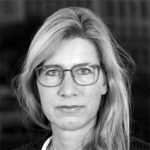
Panel 3.
Visual Translation
in Global Contexts
Keynote Speaker: Birgit Mersmann (University of Duisburg-Essen)
Moderator: Modesta Di Paola (UCM)
The notion of “visual translation”, as a set of practices and theoretical positions subject to constant negotiations, is imposed within an interdisciplinary framework that encompasses both art history and comparative literature, critical iconology, visual studies, philosophy and translation studies. Current studies of the vision motivate us to use the term “visual translation” not only to refer to a theoretical comparison between the arts and literature or linguistics (as in the case of ekphrasis and in general of the interartistic phenomena) but also to interpret, through new readings and methodologies, contemporary artistic phenomena, whose conceptual axes are identity, society, territory and politics. In this context, the act of interpreting arises from the need to decode the work of art in relation to the historical and geographical context in which it was produced, but also in relation to the context in which its reception takes place. In a global world, however, many works of art seem to remain within an intellectual oblivion given by the difficulty of understanding and deciphering them. The concept of visual translation is therefore related to a hermeneutical notion that reflects on the complexities of the contemporary artistic artifact, but also with an epistemological attempt at reflection on the cultural and linguistic exchanges that take place between subjects and international events. In the era of the globalization of art, its public is heterogeneous, mobile, unpredictable, diasporic, hybrid. Visual translation, therefore, falls within the broader scope of visual communication, the transmission of messages, the means used as vehicles of information and consequently the way of receiving and decoding them culturally.
As a metaphor, translation can include any visual process. That is why you need to detect some tropes in the relationship between translation and art. To use familiar terminology for translation studies, we could call these issues “contact zones” in which to find the affinities and interferences between translation and visual production.
Closing Keynote Lectures
Keynote Speaker: Francisco Jarauta (Universidad de Murcia), “Babel, mito moderno”
 Francisco Jarauta studied Philosophy, History of Art and Anthropology in Valencia, Rome, Münster, Berlin and Paris and has been Professor of Philosophy at the University of Murcia. He is the author of numerous publications and curator of several exhibitions – the most recent one, “El hilo de Ariadna”, with which the cultural center La Casa del Lector (Madrid) was inaugurated -, his studies focus on the philosophy of culture, the history of ideas, aesthetics and the theory of art. Known for his talent as a speaker, Professor Jarauta’s concerns go further, encompassing other fields of knowledge, such as architecture or travel literature.
Francisco Jarauta studied Philosophy, History of Art and Anthropology in Valencia, Rome, Münster, Berlin and Paris and has been Professor of Philosophy at the University of Murcia. He is the author of numerous publications and curator of several exhibitions – the most recent one, “El hilo de Ariadna”, with which the cultural center La Casa del Lector (Madrid) was inaugurated -, his studies focus on the philosophy of culture, the history of ideas, aesthetics and the theory of art. Known for his talent as a speaker, Professor Jarauta’s concerns go further, encompassing other fields of knowledge, such as architecture or travel literature.
Keynote Speaker: Antoni Muntadas (Visual Artist), “Interpretations and translations”
 Antoni Muntadas was born in Barcelona in 1942 and has lived in New York since 1971. Through his works he addresses social, political and communications issues such as the relationship between public and private space within social frameworks, and investigates channels of information and the ways they may be used to censor or promulgate ideas. His projects are presented in different media such as photography, video, publications, the Internet, installations, and urban interventions.
Antoni Muntadas was born in Barcelona in 1942 and has lived in New York since 1971. Through his works he addresses social, political and communications issues such as the relationship between public and private space within social frameworks, and investigates channels of information and the ways they may be used to censor or promulgate ideas. His projects are presented in different media such as photography, video, publications, the Internet, installations, and urban interventions.
Venue
UB, Universitat de Barcelona / Aula Magna
Montalegre 6, 4th Floor, 08001 Barcelona, Catalonia
www.ub.edu

